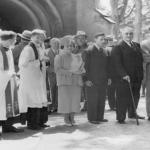My present book project is unusual, even by my standards. I am writing a history of the United States in a really distant and obscure era, namely since the year 2000. I’ll be talking about some themes arising from this in coming blogs, but today I want to look at a very specific and actually fundamental question about the country we are dealing with, about America. What, and where, is this America anyway?
This issue emerged for me some years ago when I served on a committee exploring the future of an American Studies program, of a kind that is very common across academe. A colleague argued forcefully that the first thing to do was to change the title of the program, and rethink its whole scope. America, she said, no longer meant America, and we have to take account of that. To put it mildly, lively debate ensued.
Let me explain.
Citizens of the United States have always thought of themselves as Americans, and informally, they speak of their country as “America.” When European media speak of life in America, or discuss how America will respond to a situation, we are always meant to understood “the United States.” With admirable clarity, protesters threaten “Death to America.”
But Spanish-speakers use the term differently, so that “America,” or the Americas, is a geographical description for the whole continent, and the term Americanos includes Argentines or Nicaraguans. People living in the United States are North Americans, Norteamericanos, or even “US” (estadounidense). I quote an Atlantic column: “In Latin America, ‘American’ means anyone from the American continent. U.S. citizens claiming the word are considered gauche or imperialist.” In practical terms, that is why Latin American militants favored the slogan “Yankee Go Home!” because using “American” in that context made no sense whatever.
I say the following based on something read recently, so please correct me if it is wrong. In the early nineteenth century, inhabitants of the former Spanish and Portuguese Americas counted themselves together with the US as all Americans in common. After the Mexican-American war of the 1840s, they drew some distinction, counting themselves as “Latin Americans,” defined against the USA, and distinctive from it. In this view, the US was not really, entirely, American.
Either way, what we call Latin Americans define themselves simply as “Americans,” differing from the familiar US usage. If that difference of usage was once a linguistic curiosity, it acquires a whole new significance in a very near future United States in which over a quarter of the population claims Latino roots. Some offer still higher projections for Latino numbers by 2050 or so.
Already, the use of “America” for the US is hotly debated in academic circles. For my colleague, we should properly call the discipline US Studies, but if we insist on calling it American Studies, it has to cover the whole Americas, North and South. (Incidentally, that colleague was Anglo rather than Latino). Within a few years, that distinction likely will spread from the academic/activist margin to the mainstream, and “America” will no longer automatically imply the US. In that important sense, we are quite literally “rethinking America.”
Will we also be redefining and renaming American History, and American Religious History? On an immediate practical point, should I use “America” in the title of my current book?
You may think that such concerns are hyper-sensitivity and political correctness gone mad, and it will never catch on. Just like we will never use gender neutral pronouns, or call black people African-Americans, or use “gay” for homosexual. It could never happen.
Not in our America.













